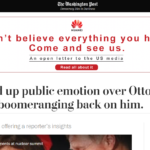I log in to the crunchy sound of tumbleweeds crossing the horizon. I whistle an echoing dirge as the only carpenter in town solemnly hammers away at a casket. And when I post, it’s not so much that crickets chirp as the one cricket that’s left looks up, says “screw it,” and goes back to filing its nails.
That’s what Twitter’s like for me – a ghost town that’s a professionally-rendered obligation. That obligation doesn’t just apply to Twitter, but it’s the most recent in a queue of platforms that became almost unusable to me on a personal level and then lost whatever benefit they’d brought to my work as a journalist.
Facebook and Twitter were created in the mid 2000s, and by the first half of this decade, journalists were still asking themselves if they should make social media a priority.
That is quite a contrast from what’s turned into a heavy reliance on social media for everything from building an audience to determining what to cover and how to cover it. Social media was years ago ruined by algorithms that weaponize information, constrict audience reach and enable harassment, so why do we still think of it as an obligatory part of our job descriptions?
Social media rules at amplifying disinformation and stripping its users of basic privacy, things that nonpartisan American journalists would presumably be against, rather than willingly opt into. The dystopia George Orwell envisioned in “1984” seems like an outrageous impossibility only if we refuse to consider our acceptance of the ways Facebook and other platforms gradually accustomed us to their lapses in judgment, which grew in scope and frequency. Social media’s impact on culture, politics, media and information itself is ubiquitous, historically unmatched and unacceptable, yet accepted.
Bearing that in mind, I’m not sure if any of us should use social media, but I can make a decent case for why journalists should at the very least take a deeper look at how and why they use various platforms and ask if the benefits ultimately outweigh the costs.
Journalists originally touted using social media for three main reasons: as a way to promote our work, connect with readers and as a tool for finding tips, sources and story ideas. The two main platforms journalists use, Twitter and Facebook, are falling short in all of these areas.
Plugging news stories on Twitter and Facebook in 2019 is less effective than it was just a year ago for vastly different reasons. For Twitter, it comes down to a plunging user base that last year fell to its lowest number of monthly users in two years. Twitter claimed its loss of 5 million monthly users was due to its crackdown on bots and spam, but many of the people I’ve followed for years have left or post way less often than they used to. That makes the platform less fun to use, but also affects how well it can generate pageviews.
Facebook’s daily audience is more than 10 times that of Twitter, but there’s a major hitch: Facebook’s algorithm essentially screws news organizations out of pageviews. The company’s most recent algorithm, for example, knocked nonpartisan news organizations down in the ranking, leaving many publications (including this one) to watch their Facebook traffic sink.
Even if that weren’t the case, the company is the antithesis of an ally to nonpartisan media, particularly given its demonstrated, albeit unacknowledged, commitment to harvesting newspapers’ lost ad revenue and boosting misinformation.
Although journalists still successfully connect with their audiences on social media, many women and journalists who aren’t white Protestants report harassment. Amnesty International, for example, estimates that female journalists were harassed on Twitter every 30 seconds in 2017. Whatever its potential for connection, social media is one-part benefit and one-part hazard for some journalists in a way that makes the expectation of our across-the-board participation uneven and perhaps unreasonable.
So does social media ultimately improve our reporting? I personally haven’t gotten much out of it by way of building sources, but despite all my arguments against social media, I do think there’s some value in seeing what people are talking about and what stories are getting the most attention.
Heidi Moore, a media consultant, addressed this in a Twitter thread yesterday, suggesting that some journalists sub Twitter for reporting work. Moore called the platform an “assignment editor” that draws reporters’ attention to these supposed hot-button issues, many of which are distractions from topics of substance. The controversies then become actual news stories, reaching an audience well beyond the platform despite their unearned news value.
“It is not real life,” Moore said of Twitter. “When we assign stories based on Twitter controversies, we present the world dishonestly.”
I use Twitter and Facebook for one reason. There isn’t a worthwhile substitute, perhaps because of the veritable monopoly of the major platforms. If there were another choice, I would join in an instant.
What was great about social media is gone, but the platforms live on as zombie versions of what could have been.
Contact Mollie Bryant at 405-990-0988 or bryant@bigiftrue.org. Follow her on Facebook and Twitter.
An excerpt from this piece also ran in our newsletter, Hard Reset. Sign up for Hard Reset here.



